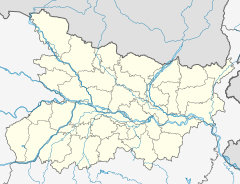Mandar Parvat, also known as Mandar Hill is a small mountain situated in Bounsi, Banka district under Bhagalpur division of state of Bihar.[1] It is about 700 ft high and approximately 45 km south of Bhagalpur city of Bounsi, a place located on the state highway between Bhagalpur and Dumka. Mandar Hill is a great place of pilgrimage although it is not so well known now. On top of the hill areJain temples and on bottom of the hill are Hindu temples.[2] A carnival is organised every year at Mahavir Jayanti & Makar Sakranti.
| Shri Mandar Parvat Tirth | |
|---|---|
Mandar giri | |
 Nirvan Sthal of 12th Tirthankara Vasupujya | |
| Religion | |
| Affiliation | Jainism, Hinduism |
| Deity | Vasupujya and Vishnu |
| Festivals | Mahavir Jayanti, Makar Sankranti |
| Location | |
| Location | Banka district, Bihar, India |
| Geographic coordinates | 24°50′28″N 87°02′07″E / 24.841165°N 87.035391°E |
| Temple(s) | 12 |
Religious Significance
editJainism
editMandar Parvat, is believed to place of three out of five kalnayak (Panch Kalyanaka) — diksha, kevala jnana, and nirvana of Vasupujya, the 12th tirthankara in Jainism.[3]
Hinduism
editThe mountain has many references in Hindu Mythology as Mandarachal Parvat. As per references found in the Puranas and the Mahabharata, this hill was used for churning the ocean to extract the nectar from its bosom (Samudra Manthan). There is, adjacent to this hill, a pond called "Paapharni". This holy pond has its own historical significance. It is a place where you can revive yourself after taking a bath in the pond that refreshes you mentally and physically. In the middle of the pond is a temple of Lord Vishnu and Goddess Lakshmi.
Many rare sculptures of Lord Shiva, Kamadhenu and Varaha, believed to be of 11-12th century AD, can be found to be scattered around Mandar Hill. These rare artifacts need to be conserved by Archaeological Survey of India.[4]
Gallery
edit-
Vasupujya Jain temple
-
Vishnu temple
-
Depiction of Samudra Manthana
References
editCitations
edit- ^ "Mandar Hill". hindubooks.org. Archived from the original on October 16, 2014. Retrieved November 1, 2010.
- ^ "Mandar Hill at Banka". explorebihar.in. Archived from the original on December 17, 2017. Retrieved December 27, 2017.
- ^ Titze & Bruhn 1998, p. 202.
- ^ "Antiquities destroyed in Bihar's Mandar hills ropeway project". March 30, 2017.
Sources
editTitze, Kurt; Bruhn, Klaus (1998). Jainism: A Pictorial Guide to the Religion of Non-Violence (2 ed.). New Delhi: Motilal Banarsidass. ISBN 81-208-1534-3.
External links
editMedia related to Mandar Parvat at Wikimedia Commons
